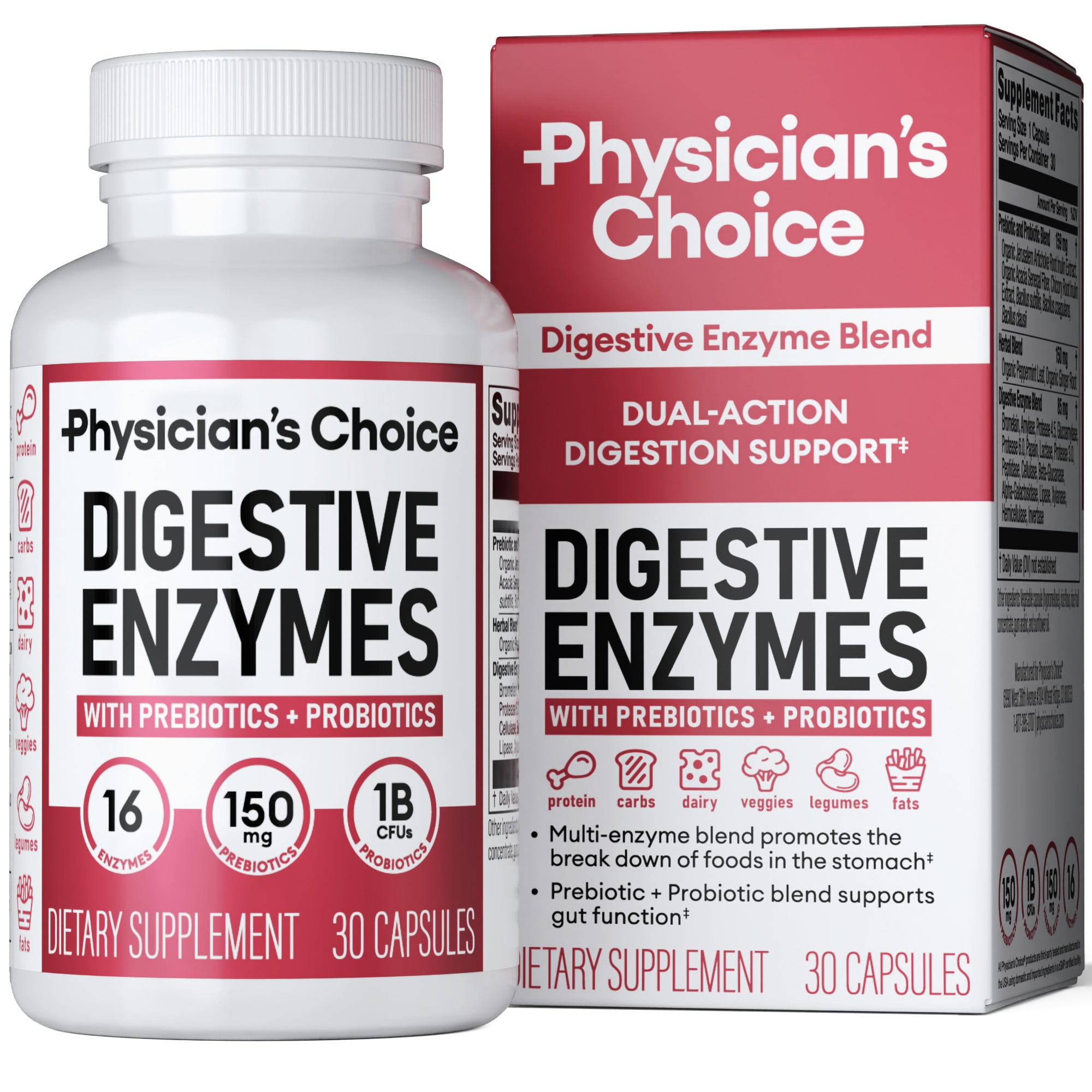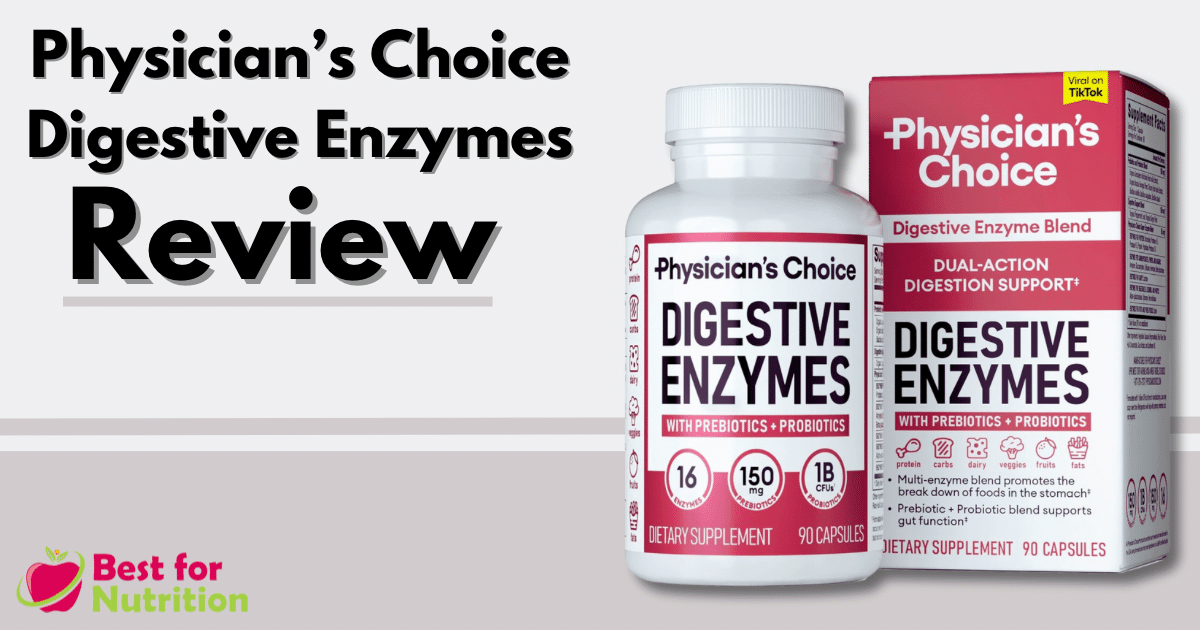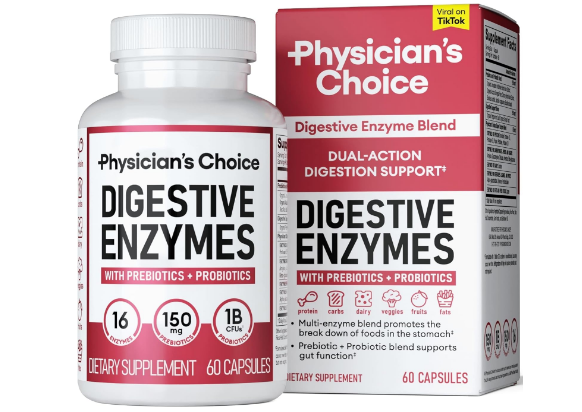Do Physician's Choice Digestive Enzymes Work

Digestive distress, ranging from occasional bloating to chronic irritable bowel syndrome (IBS), affects millions worldwide. The quest for relief has fueled a booming market for digestive aids, with enzyme supplements like those offered by Physician's Choice gaining significant traction. But amidst the marketing claims and anecdotal evidence, the fundamental question remains: do these products truly work, and are they a safe and effective solution for digestive problems?
This article delves into the science behind Physician's Choice Digestive Enzymes, examining their ingredients, purported benefits, and the available scientific evidence supporting their efficacy. It will also explore potential risks and limitations, providing a balanced perspective to help consumers make informed decisions about their digestive health.
Understanding Digestive Enzymes and Their Role
Digestive enzymes are biological catalysts that break down food into smaller molecules, facilitating nutrient absorption. The body naturally produces these enzymes in the pancreas, stomach, and small intestine. These naturally created enzymes are critical for breaking down carbohydrates, proteins, and fats into usable nutrients.
Deficiencies in these enzymes can lead to digestive issues such as bloating, gas, diarrhea, and nutrient malabsorption. This is where supplemental digestive enzymes come into play, promising to augment the body's natural enzyme production and alleviate these symptoms.
Physician's Choice Digestive Enzymes: A Closer Look
Physician's Choice offers a range of digestive enzyme supplements, with their flagship product containing a blend of enzymes targeting various food groups. These include amylase for carbohydrates, protease for proteins, lipase for fats, and cellulase for fiber. Some formulations also include probiotics to further support gut health.
The company claims their product can improve nutrient absorption, reduce bloating and gas, and support overall digestive health. These are pretty significant promises to make.
Analyzing the Ingredients and Scientific Evidence
The efficacy of Physician's Choice Digestive Enzymes hinges on the effectiveness of its individual components. While each enzyme has a specific function, their impact can vary depending on the individual and the underlying cause of their digestive issues.
For example, studies have shown that supplemental amylase can be beneficial for individuals with pancreatic insufficiency, where the pancreas doesn't produce enough of its own enzymes. Similarly, lipase supplementation can aid fat digestion in those with fat malabsorption issues. Some research suggests certain enzyme blends can reduce symptoms of IBS like bloating and abdominal pain.
However, it's important to note that many studies are small, and their findings may not be generalizable to the broader population. Furthermore, the optimal dosage and enzyme combinations can vary widely depending on individual needs and dietary habits.
The Role of Probiotics and Gut Health
Many Physician's Choice formulations include probiotics, live microorganisms that can benefit gut health. Probiotics can help restore balance to the gut microbiome, potentially improving digestion and reducing inflammation. A healthy gut is crucial to overall wellness.
Research suggests that certain probiotic strains can alleviate symptoms of IBS, such as bloating, gas, and constipation. However, the effectiveness of probiotics can vary depending on the specific strains used and the individual's gut microbiome composition.
It's important to choose a probiotic supplement with strains that have been shown to be effective for specific digestive issues. Not all probiotics are created equal.
Potential Risks and Side Effects
While generally considered safe, digestive enzyme supplements can cause side effects in some individuals. These can include nausea, diarrhea, abdominal cramps, and allergic reactions. It's always best to consult with a healthcare professional before starting any new supplement regimen.
Individuals with certain medical conditions, such as pancreatitis or gallbladder disease, should exercise caution when taking digestive enzyme supplements. Always discuss any supplement use with your doctor, especially if you have existing health concerns.
The FDA does not regulate supplements in the same way it regulates prescription drugs. This means that the quality and purity of digestive enzyme supplements can vary widely. Choosing a reputable brand that adheres to good manufacturing practices is crucial.
Expert Opinions and Recommendations
Gastroenterologists generally agree that digestive enzyme supplements can be helpful for individuals with specific enzyme deficiencies or digestive disorders.
"In cases of confirmed enzyme insufficiency, supplementation can be a valuable tool to improve nutrient absorption and alleviate symptoms," says Dr. Sarah Miller, a gastroenterologist at the Mayo Clinic.
However, experts caution against self-treating digestive issues with enzyme supplements without first consulting with a healthcare professional. "It's essential to identify the underlying cause of your digestive problems before reaching for a supplement," advises Dr. David Lee, a registered dietitian specializing in gastrointestinal health.
Dr. Lee also emphasizes the importance of a holistic approach to digestive health, including dietary modifications, stress management, and adequate hydration. Diet is just as important as medication.
The Placebo Effect and Subjective Experiences
It's important to acknowledge the potential role of the placebo effect in subjective experiences with digestive enzyme supplements. If you believe something will have an effect, it just might.
Many individuals report feeling better after taking Physician's Choice Digestive Enzymes, even if the scientific evidence is limited. While the placebo effect is not a substitute for genuine therapeutic benefits, it can contribute to overall well-being. However, positive feelings should be taken with a grain of salt if not backed by science.
It is crucial to differentiate between subjective improvements and objectively measured outcomes when evaluating the effectiveness of any digestive aid. Keep in mind that what works for one person might not work for the other.
Conclusion: A Balanced Perspective on Physician's Choice Digestive Enzymes
Physician's Choice Digestive Enzymes may offer benefits for some individuals experiencing digestive issues, particularly those with enzyme deficiencies or specific digestive disorders. The inclusion of probiotics in some formulations may further support gut health.
However, the scientific evidence supporting their widespread use is limited, and potential risks and side effects should be considered. Consumers should be wary of exaggerated marketing claims and prioritize consulting with a healthcare professional to determine the underlying cause of their digestive problems and explore appropriate treatment options.
Ultimately, a holistic approach to digestive health, incorporating dietary modifications, stress management, and, when appropriate, evidence-based enzyme supplementation, is the most likely path to long-term relief. Do not rely on supplements alone.

















